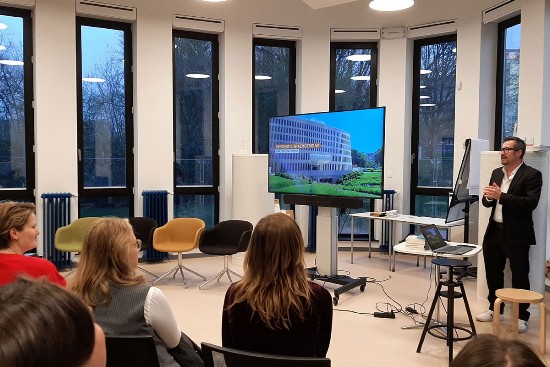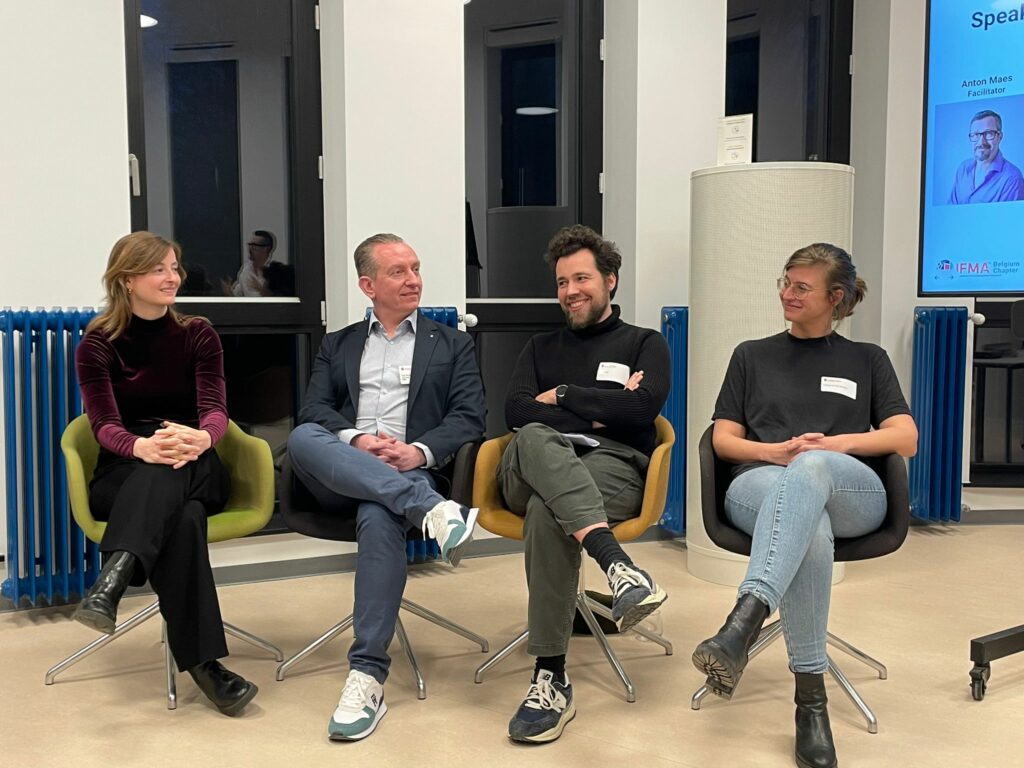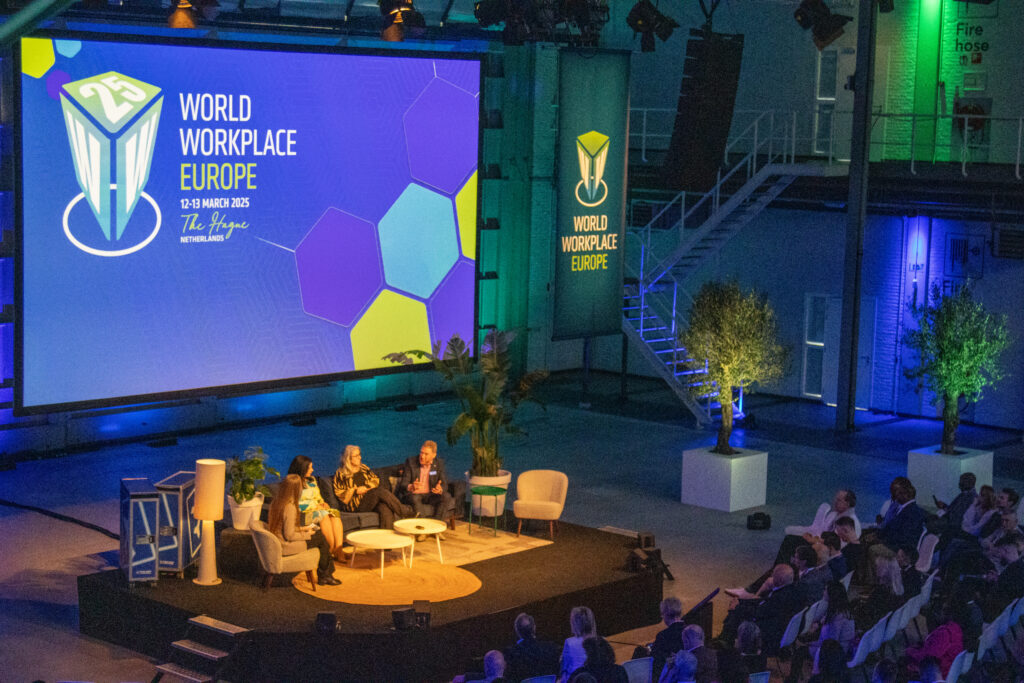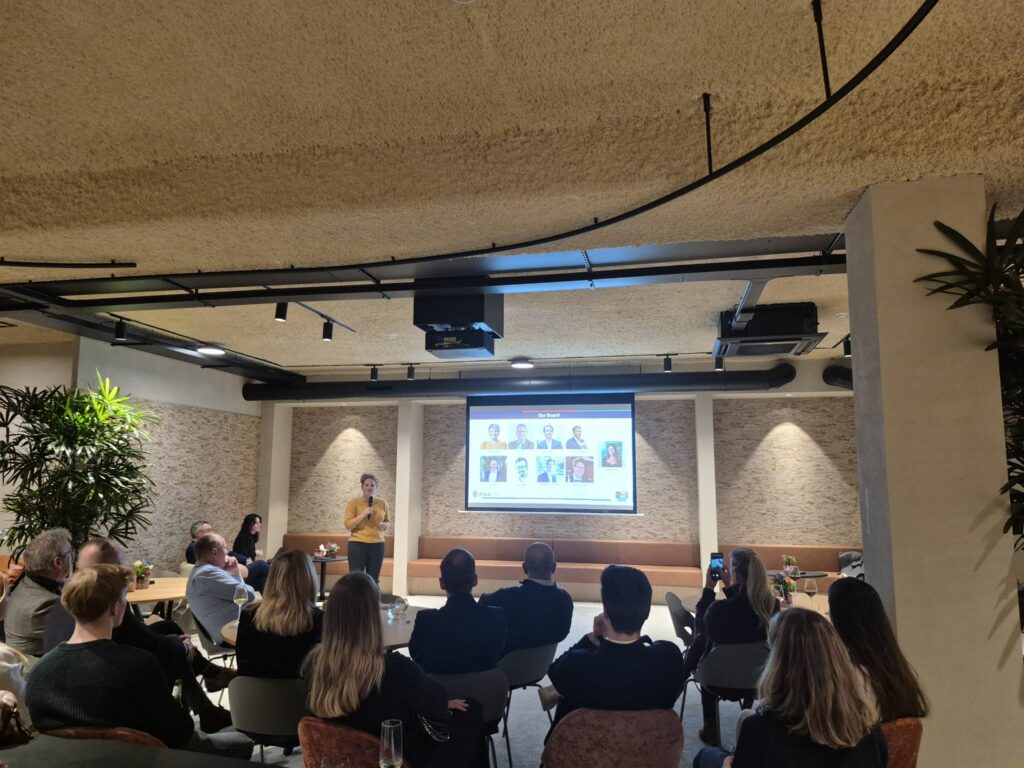The digital nomad, the next step in hybrid working?
The ‘digital nomad’ is emerging within organizations as a new challenge for both HR and Facility Management. One can view this phenomenon as meeting the maximum flexibility desires of employees or as a further evolution of the now widespread hybrid working. The IFMA Belgian Chapter certainly attracted a large audience with this theme on Thursday, March 19th.
The event venue was no less significant, symbolizing progressiveness in its era, much like the evening’s topic. It was the ‘Braem’ building on the VUB Campus. Architect Renaat Braem, renowned for his philosophical approach to architecture, laid down his design for the VUB administrative building in 1971, resulting in an impressive list of iconic buildings. Characterized by its elliptical vertical cross-section and rhythm of vertical windows, the building, completed in 1976, underwent a thorough renovation in recent years with great respect for the architect’s spirit and will be fully operational again this year.
Introduction
The ‘digital nomad’ takes time- and location-independent working very literally. They completely distance themselves from the traditional office, remote working, and even their home country. They opt for ‘working elsewhere,’ in a country and at a place that attracts them, without settling there permanently. While ‘workcation’ is a term that frequently arises, it doesn’t quite define how the ‘digital nomad’ sees themselves. To provide more clarity, the IFMA Belgium Chapter assembled a panel and actively engaged the audience through moderator Anton Maes, a Board member of IFMA Belgium and the CEO of Brainmove.
Panelists included:
- Femke Verthe, digital nomad and Business Process Facilitator at Brainmove
- Tom Ryckaert, Marketing & Communications Director at PROCOS Group, provides a technical perspective
- Isabeau Van Den Bogaert, People Business Partner at Loop Earplugs, provides an HR perspective
- Jens Doms, a Researcher at the Brussels Institute for Social and Population Studies, provides an academic perspective
Femke Verthe, speaking from experience, explains, “It’s about working from another country and not being tied to a specific location. Often digital nomads are freelancers with short contract durations who opt for this, but it can also be as an employee, which is my situation.”
Jens Doms adds, “The literature still talks about ‘remote working,’ but a digital nomad is not the same as someone who travels professionally, whether frequently and/or internationally. It’s an adventurer who wants to travel on their terms.”
Since the pandemic, the number of digital nomads has significantly increased, with the experience of remote/hybrid working contributing to this rise.
Acceptance
Tom Ryckaert notes, “Large organizations are taking it more seriously. It’s certainly not just about freelancers; it’s an evolution in how we perceive work.”
“It’s a significant change for organizations to allow and integrate digital nomads into other teams,” adds Femke Verthe.
The work context is entirely different. While digital nomads undoubtedly experience increased flexibility and work-life balance, what about their responsibility towards the employer? There’s no one overseeing their performance closely, and there are numerous distractions.
Isabeau Van Den Bogaert explains, “It’s not so much about the 8-hour workday but about the expected outcomes and how the manager can provide input to achieve those outcomes. The flexibility enjoyed can also be intimidating and add pressure.”
Jens Doms emphasizes, “Management styles need to focus on this, and leaders must be capable of managing with a results-oriented approach.”
Femke Verthe adds, “I don’t think about the 8-hour workday, but rather if I’ve completed the work. The time spent on it doesn’t matter, although subconsciously I do try to stick to those 8 hours as a benchmark.”
“Digital nomads often work harder and more than traditional employees,” continues Jens Doms. “Eight hours are a guideline but not restrictive. Besides, one can easily take an hour for a walk combined with personal brainstorming.”
“The trust I receive from my manager encourages me to work better and more,” says Femke Verthe.
Effective communication with colleagues and management is crucial for digital nomads. They can’t isolate themselves for weeks in their bubble somewhere in the world.
Productivity and Organization
Digital nomads can be as productive as their office-based or hybrid-working counterparts. Only a small portion of employees can function as digital nomads, either because their job roles prevent it or because they lack the necessary independence.
Tom Ryckaert remarks, “Employers must facilitate and support digital nomads in performing their roles. Technically, I see no problem there. Not all communication needs to happen synchronously. Some can be asynchronous or with less than optimal internet connectivity.”
Isabeau Van Den Bogaert also believes in the power of technology as support as long as the organization and the managers follow suit.
“The freedom to choose where I work also means taking 100% responsibility for my work,” continues Femke Verthe. “If the location I want to work in doesn’t support me well enough, I’ll find a local co-working space. I always carry a second, easily transportable screen with me. Communities of digital nomads are also emerging, such as in Las Palmas, Gran Canaria.”
“Flexibility is a top priority today, but those who are not strong and independent enough won’t cope and will experience increasing work pressure,” emphasizes Jens Doms.
Digital Nomads and Organizational Culture
Isabeau Van Den Bogaert emphasizes, “Belonging is important for all employees. Employers face a significant challenge here. Organizations must make an extra effort because integrating digital nomads into the company culture is possible. We have developed a management training program for this purpose.”
“It’s a delicate matter,” Jens Doms continues. “Learning from each other, including informal learning, is difficult even in a traditional physical environment. The experience is different from being physically present. This applies to remote working and even more so to digital nomads.”
“Everyone can already work outside the office environment today. Technology is constantly evolving to meet the changing needs of users,” adds Tom Ryckaert.
“Spontaneous meetings, exchanging knowledge and information, spontaneous learning from each other… are lacking or much weaker,” states Jens Doms. “There’s also little support available for digital nomads, which carries certain risks. However, I still expect more jobs to become possible for digital nomads in the future.”
Femke Verthe sees both task- and results-oriented leadership as suitable for digital nomads; “It also depends on the coaching style employed. Integrating digital nomads is much more challenging; it requires more thought and organization from the employer.”
As an experienced digital nomad, she concludes, “Digital nomads know exactly why they choose this lifestyle. They are high-potential employees who attach great importance to their life experience in all aspects.” (De Digitale Nomade, de Volgende Stap in Hybride Werken?, z.d.)



















